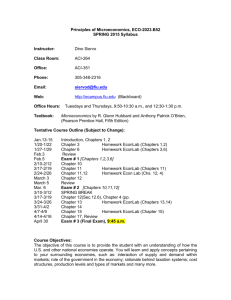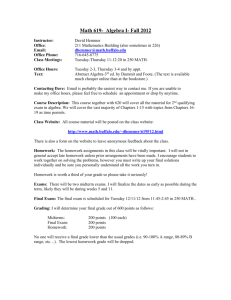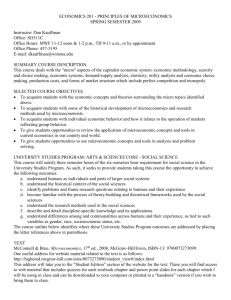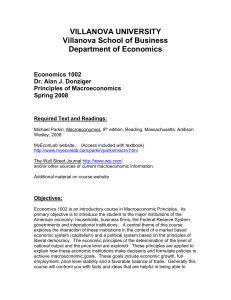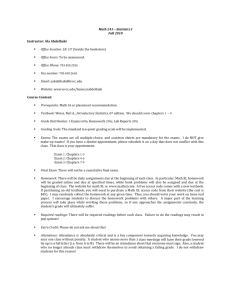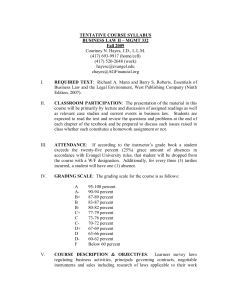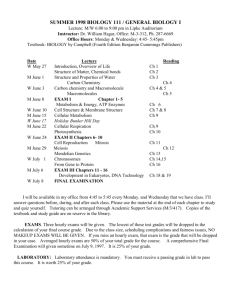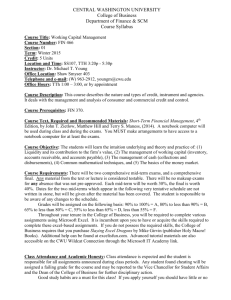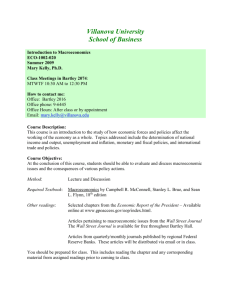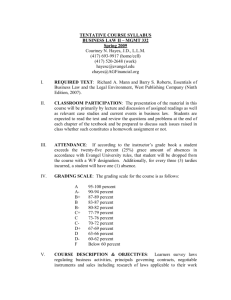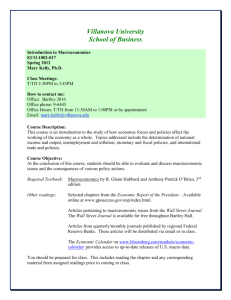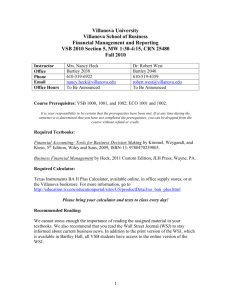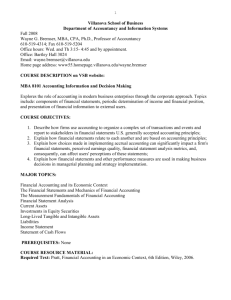Other - Villanova University
advertisement
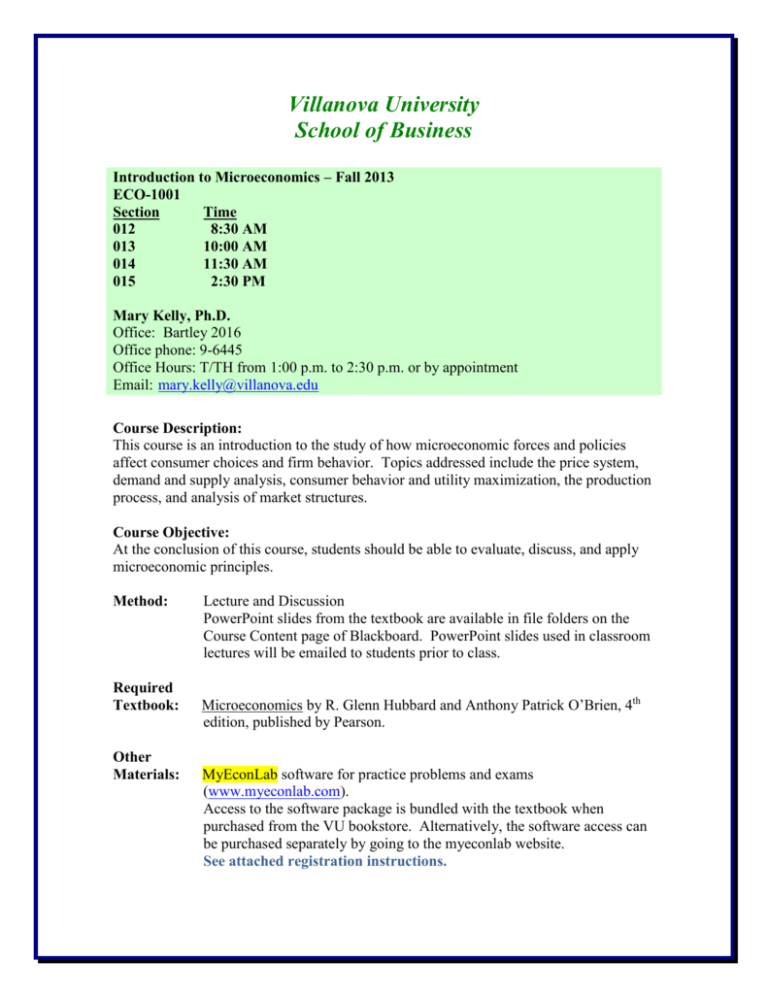
Villanova University School of Business Introduction to Microeconomics – Fall 2013 ECO-1001 Section Time 012 8:30 AM 013 10:00 AM 014 11:30 AM 015 2:30 PM Mary Kelly, Ph.D. Office: Bartley 2016 Office phone: 9-6445 Office Hours: T/TH from 1:00 p.m. to 2:30 p.m. or by appointment Email: mary.kelly@villanova.edu Course Description: This course is an introduction to the study of how microeconomic forces and policies affect consumer choices and firm behavior. Topics addressed include the price system, demand and supply analysis, consumer behavior and utility maximization, the production process, and analysis of market structures. Course Objective: At the conclusion of this course, students should be able to evaluate, discuss, and apply microeconomic principles. Method: Required Textbook: Other Materials: Lecture and Discussion PowerPoint slides from the textbook are available in file folders on the Course Content page of Blackboard. PowerPoint slides used in classroom lectures will be emailed to students prior to class. Microeconomics by R. Glenn Hubbard and Anthony Patrick O’Brien, 4th edition, published by Pearson. MyEconLab software for practice problems and exams (www.myeconlab.com). Access to the software package is bundled with the textbook when purchased from the VU bookstore. Alternatively, the software access can be purchased separately by going to the myeconlab website. See attached registration instructions. Articles and case studies relevant to chapter discussions. These articles and case studies will be distributed via email. The Wall Street Journal is available for free throughout Bartley Hall or online at www.online.wsj.com/home-page. Requirements Exams I (Chapters 1 through 4) II (Chapters 5, 6, 10, 11) III (Chapters 12, 13, 14 + industry study) FINAL EXAM Class Participation % 65* 25 10 Date September 24 October 29 December 3 December 19 at 11:30 AM *The lowest exam score will be weighed at 15%. The two remaining exams will be weighed at 25% each. Exams: Exams must be taken on the scheduled dates. Make-up exams will be offered only if you present documentation from a medical professional of illness or documentation for extraordinary circumstances preventing attendance. Determination of eligibility for a makeup will be solely left up to my discretion. Final Exam: The final exam will cover all chapters and is scheduled by the University for Thursday, December 19 at 11:30 AM. DO NOT schedule transportation home that conflicts with taking the exam at this time. Class Participation: You may be called on at random. Therefore, you should be prepared for class. This includes reading the chapter and any corresponding material from assigned readings prior to coming to class. Questions, comments, and discussion are valued, encouraged, and appreciated. Laptops are not permitted to be used in class unless instructed by me. Prior to class, you may print the lecture PPT slides and take notes on them. Begins at 94 90 87 84 80 77 Grade A AB+ B BC+ Begins at 74 70 67 64 60 Below 60 Grade C CD+ D DF Grading is determined based on the specified criteria. TO BE FAIR TO ALL STUDENTS, THERE IS NO STUDENT-SPECIFIC EXTRA CREDIT OFFERED IN THIS COURSE. Integrity Policy: The Code of Academic Integrity of Villanova University addresses cheating, fabrication of submitted work, plagiarism, handing in work completed for another course without instructor’s approval, and other forms of dishonesty. For the first offense, a student who violates the Code of Villanova University will receive 0 points for the assignment. The violation will be reported by the instructor to the Dean’s Office and recorded in the student’s file. In addition, the student will be expected to complete an educational program. For the second offense, the student will be dismissed from the University and the reason noted on the student’s official transcript. Classroom Etiquette: It is expected that students and the professor will: display courtesy and respect for each other during class. arrive on time and remain until the class ends. Unless it is an emergency, bathroom breaks should be taken before or after class. turn off all computers, cell phones, tablets, and other electronic devices prior to the start of class. The classroom is a professional environment. Students and the professor will conduct themselves accordingly. This includes, but is not limited to, no hats or other head coverings except for documented religious reasons, no side bar conversations, other extraneous chatter, or other inappropriate behavior. Disability Statement: It is the policy of Villanova to make reasonable academic accommodations for qualified individuals with disabilities. If you are a person with a disability, please contact me after class or during office hours and make arrangements to register with the Learning Support Office by contacting Nancy Mott at 610-519-5636 as soon as possible. Registration is needed in order to receive accommodations. Tentative Course Outline: Week(s) 1-4 (8/27 – 9/19) Chapter(s) and Assignments Review of syllabus Chapter 1 - Economics: Foundations and Models (and Appendix) Chapter 2 - Tradeoffs, Comparative Advantage, and the Market System Chapter 3 – Where Prices Come From: The Interaction of Demand & Supply Chapter 4 – Economic Efficiency, Government Price Setting, and Taxes 5 5-9 (9/26 10/24) EXAM I (Chapters 1 through 4) on September 24 Chapter 5 – Externalities, Environmental Policy, and Public Goods Chapter 6 – Elasticity: The Responsiveness of Demand and Supply Chapter 10 – Consumer Choice and Behavior Economics (and Appendix) FALL BREAK during week 8 Chapter 11 – Technology, Production, and Costs (and Appendix) 9 10- 15 (10/31 – 11/28) EXAM II (Chapters 5, 6, 10, 11) on October 29 Chapter 12 – Firms in Perfectly Competitive Markets Chapter 13 – Monopolistic Competition: The Competitive Model in a More Realistic Setting Chapter 14 – Oligopoly: Firms in Less Competitive Markets Industry Study 15 15-16 (12/05 12/12) EXAM III (Chapters 12, 13, 14) on December 3 17 FINAL EXAM on December 19 at 11:30 AM Chapter 15 – Monopoly and Antitrust Policy Open topic: Labor (unions and immigration) Income Inequality and Poverty
